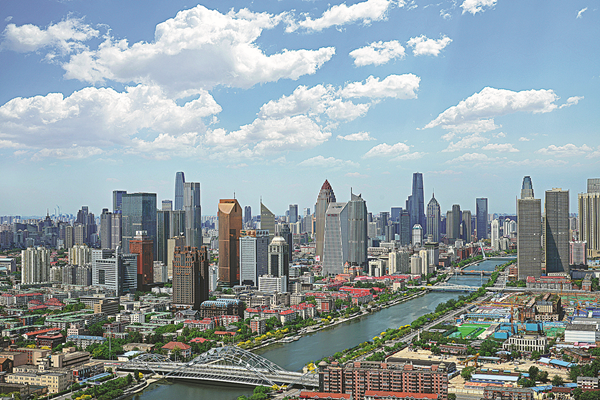Tianjin improves coast water quality
(chinadaily.com.cn)| Updated : 2022-07-28
Print Print
A panoramic view of downtown Tianjin. [Photo/China Daily]
Razor clams used to be easily found in the coastal mud flats near the 12 major rivers that empty into the sea around Tianjin. However, with pollution in the Bohai Sea escalating in the 1980s, they became a rare sight since.
But Li Yongren, associate professor from Tianjin Agricultural University, who has conducted regular field surveys of Tianjin's coastal mud flats since 2010, has found that the species is coming back.
He was first surprised to find a razor clam in 2018. His research in the following years has shown an optimistic situation.
"Aside from an increase in their population, I have found in my follow-up field research that the habitats of razor clams are expanding from the mouths of estuaries to their upper reaches," he noted, adding their appearance demonstrated that pollutants have been effectively curbed from entering the sea.
This was something unimaginable in 2017, he said, as all of the 12 watercourses were found to have water quality below Grade V. Grade V is the worst level in the country's five-tier quality system for surface water.
The encouraging change happened after Tianjin was rebuked by central environmental inspectors five years ago. After wrapping up their one-month visit to the city, inspectors depicted a gloomy water pollution control situation.
Due to a lack of sewage disposal facilities for an extended period of time, many of the water bodies that empty into the sea were overwhelmed by wastewater. The insufficient natural flows in them worsened the situation, said the Ministry of Ecology and Environment after the inspection.
Staffed by officials from the ministry, inspection teams are usually led by ministerial-level officials and they report to a central group headed by Vice-Premier Han Zheng.
Spurred by the inspection, the city has rolled out a series of measures to improve water pollution control, according to the Tianjin city department of ecology and environment.
The city has made great efforts to move polluting enterprises into industrial parks, it said. Aside from new industrial projects, ones that need to be expanded and those with inadequate sewage disposal facilities were all asked to move into parks.
Thanks to consistent efforts to improve sewage disposal capabilities in industrial parks, it said all wastewater in parks across Tianjin is collected for concentrated, highly-efficient treatment.
The department also noted significantly intensified capacity to dispose of domestic sewage. By the end of 2021, the daily capacity in the city had reached almost 4.1 million metric tons, compared with about 3.1 million tons in 2016.
Thanks to these measures, water quality in all 12 rivers emptying into the sea had reached Grade IV last year, it said.